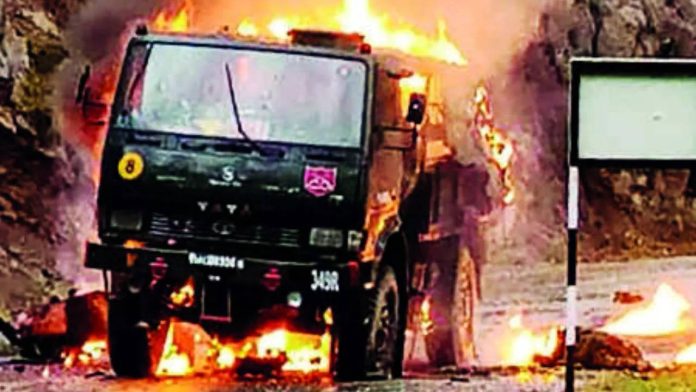
The recent attack on an Indian army vehicle by Pakistan backed terrorists in the Poonch area of J&K that claimed five lives is an extremely tragic incident that serves as a grim reminder of the fact that despite facing a host of extremely menacing domestic threats ranging from political instability to financial meltdown and burgeoning terrorism, Pakistan Army’s proxy war against India through state sponsored terrorism continues unabated.
The fact that Pakistan remained ‘grey-listed’ by international terror funding watchdog Financial Action Task Force [FATF] for four years leaves no room for doubt regarding its complicity in abetting and sponsoring terrorism. In fact, in 2019, the then Pakistani Prime Minister Imran Khan himself admitted that “when you talk about militant groups, we still have about 30,000-40,000 armed people who have been trained and fought in some part of Afghanistan or Kashmir” [emphasis added].
Khan’s revelation throws up some very pertinent questions such as- what makes terrorists of all colour and hue converge onto Pakistan? Why did Al Qaeda founder Osama Bin Laden choose to settle down in Pakistan? How come nearly 150 terror entities and individuals blacklisted by the UN Al Qaeda Sanctions Committee are either based in Pakistan, have links in the country or operate from the Pakistan-Afghanistan border areas?
The international community’s failure to seriously introspect on the potential dangers of Khan’s damning revelation and the fact that Pakistan hosts the largest number of UN designated terrorists, though deplorable, is still welcome. This is because it unambiguously exposes the harsh reality that despite waxing eloquent on creating a united front to unitedly tackle the scourge of terrorism, countries only take meaningful action on this issue when they are directly threatened.
Pakistan tries to conceal its use of terrorism as an instrument of foreign policy by playing the terror ‘victim’ card, but there is a mountain of evidence that exposes Rawalpindi’s enduring role in fuelling terrorism in J&K. What’s most surprising is that the Pakistan Army has no qualms whatsoever in directly associating itself with separatist activities in Kashmir and on this issue, former Pakistan Army chief Gen Qamar Javed Bajwa’s post Article 370 abrogation statement comes to mind.
Readers would recall that a day after New Delhi abrogated Article 370, the then Pakistan Army chief Gen Bajwa announced that “Pakistan Army firmly stands by the Kashmiris in their just struggle to the very end. We are prepared and shall go to any extent to fulfil our obligations…” [emphasis added]. This statement merits thorough deliberation as it clearly establishes Rawalpindi’s role in propelling proxy war in J&K. Let me explain.
When the government of Pakistan officially acknowledges providing political, moral and diplomatic support to separatists in J&K, isn’t Pakistan Army’s support to this lobby axiomatic? Hence, where’s the need for the Army to reaffirm this commitment? Secondly, what exactly does Rawalpindi’s assertion that the Pakistan Army is “prepared and shall go to any extent to fulfil our obligations” imply? [emphasis added].
Since the Pakistan Army doesn’t have any political or diplomatic outreach and as such what does Rawalpindi’s assurance actually mean?
The only conceivable “obligations” that the Pakistan Army could possibly have is provision of military related assistance to terrorists fighting in J&K in terms of training, supply of weapons and in providing safe sanctuaries. This Rawalpindi is duty-bound to do, because [to borrow United Jihad Council chief and Hizbul Mujahideen supremo Syed Salahuddin’s words], terrorists in J&K are actually “fighting Pakistan’s war in Kashmir”! [emphasis added].
What is important is that by saying that “We will continue to provide political, moral and diplomatic support to our Kashmiri brothers,” Pakistan Army’s present Chief Gen Asim Munir has indicated that Rawalpindi will continue supporting terrorist groups in J&K as hitherto fore. So, it would really be naïve to expect that Pakistan will discontinue its proxy war in J&K or hope that the international community will compel Islamabad to cease keeping snakes in the backyard to bite its neighbours.
The harsh reality is that while the ongoing proxy war being fuelled by Rawalpindi in J&K is here to stay, Rawalpindi is simultaneously making preparations on a war footing to open another such ‘front’ in Punjab by supporting Sikh separatists seeking ‘Khalistan’. Since the writing on the wall is clear, to expect Rawalpindi [which calls the shots in Pakistan] to have a change of heart is an unpardonable delusion.
New Delhi has no other option but to adopt a tough approach, and shedding its characteristic trepidation arising out of its ‘what will the others say’ syndrome, formulate a proactive no-holds-barred strategy that dissuades Pakistan from sponsoring proxy wars against India. To those who oppose strong action against Pakistan’s perfidy on the grounds that it will invite retaliation leading to loss of lives and limbs need to answer just one question- isn’t this happening even now when we’re doing more of talking rather than acting?
